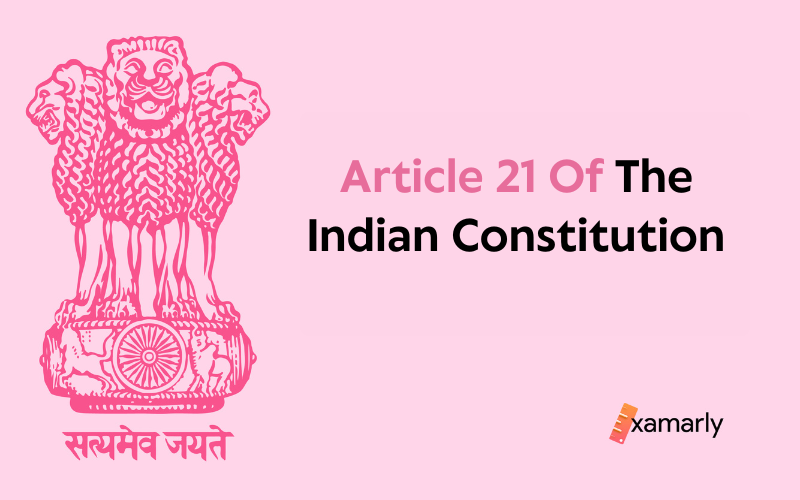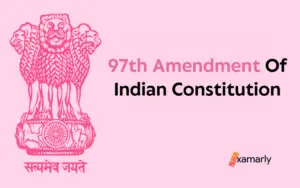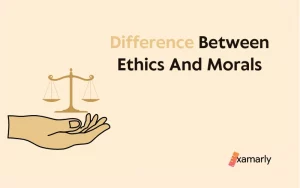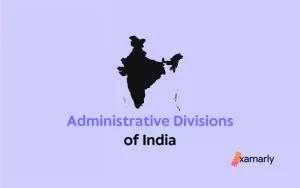The clause forbids the denial of rights in accordance with legal processes. The core of the Indian Constitution is Article 21. It is the most natural and forward-thinking clause in the Indian Constitution. The Indian Constitution’s charter of rights safeguards fundamental rights. Article 21 of the Indian Constitution discusses various important topics. These topics are such as equality before the law, freedom of speech and expression, as well as freedom of religion and culture. Every Indian citizen is covered by Article 21. Foreign nationals are also eligible to use it.
Let us discuss the major provisions and details related to Article 21 through the following text.
- Article 21 Of The Indian Constitution
- Right To Life And Personal Liberty
- Meaning And Scope Of Article 21
- The Right To Live With Human Dignity
- Right To Reputation
- Right To Livelihood
- The Right To Shelter
- The Right To Social Security And Protection Of Family
- Right To Health And Medical Care
- Right To Get Pollution-Free Water And Air
- Right To Clean Environment
- Right To Information
- Right To Personal Liberty
- Right To Education
- Right To Privacy
- Woman's Right To Make The Productive Choices
- Right Against Illegal Detention
- Right Against Sexual Harassment In The Workplace
- Prisoners' Rights
- De-Criminalisation Of Suicide
- Right To Life And Euthanasia In India
- Important Cases
- Conclusion
- FAQs Regarding Article 21 Of The Indian Constitution
- What Is Article 21 Of The Indian Constitution?
- What Is Article 21A?
- Is Article 21 An Absolute Right?
- Which Article Gives The Protection Of Life And Personal Liberties?
- What Is A Woman's Right To Make Productive Choices Under The Right To Life?
- Which Case Gave A New Dimension To Article 21?
- What Is The Main Purpose Of Article 21?
- What Are The Types Of Euthanasia?
Article 21 Of The Indian Constitution
The protection of life and individual liberty is the focus of Article 21. No one may be deprived of their life or personal freedom other than in accordance with legal procedures.
Article 21 is part of Part III of the Indian Constitution. Both citizens and non-citizens alike can exercise this freedom. This right has been referred to as the “heart of fundamental rights” by the Supreme Court. Article 21 “embodies a fundamental value of supreme importance in a democratic society,” according to Justice Bhagwati. The right to life and the right to personal liberty are both protected by it. In an emergency, Article 21 cannot be suspended.
Article 21A discusses the right to education.
Right to education- Article 21 states that all children between the ages of six and fourteen are entitled to an education. They can have free and compulsory education, as determined by state law.
It’s crucial to remember that Article 21 only applies when the “State” as defined in Article 12 of the constitution of India deprives a person of his “life or “personal liberty” Thus, infringement of a fundamental right by a private individual will not be covered by Article 21.
Right To Life And Personal Liberty
Right To Life
Every citizen is entitled to life, liberty, and personal security. According to the Indian Constitution, the right to life is a basic freedom. Only living things have human rights tied to them. The most important right that citizens have is the right to life. If Article 21 had been interpreted in its original context then there’s a case. There wouldn’t have been any Fundamental Rights worth noting.
The right to life encompasses all those parts of life. The parts of life that contribute to making a person’s life meaningful, complete, and worthwhile. And it is a fundamental aspect of life without which we cannot exist as human beings. Only one section of the constitution has been interpreted as broadly as feasible. The right to food, shelter, sufficient light, and protection is recognized in Article 21 of the Indian Constitution. Because it is the absolute minimum. It is an absolute minimum that is necessary for a person to have the right to life and other rights. It is essential and unavoidable.
Right To Personal Liberty
According to the Indian Constitution, our law’s sole mission is to preserve our rights to liberty. As can be seen, the Indian Constitution is protected by the Supreme Court, the concerned authority. In light of this, the Supreme Court is only required to ensure inquiry and protect fundamental rights. We have all of the legally recognized fundamental rights as Indian citizens. Therefore, whenever one of our fundamental rights is violated, the Supreme Court can be used to enforce it.
The Supreme Court has the authority to exercise judicial review by issuing writs or orders to enforce basic rights. It was because the right to a constitutional remedy is a component of those rights. The Supreme Court has established the legal system as a pillar of personal liberties.
With the remark that “it cannot be stated that surveillance by domiciliary visit or conduct visits at night would always be an excessive infringement upon the right of privacy”, the Supreme Court refrained from overturning these intrusive regulations.
Meaning And Scope Of Article 21
The Right To Live With Human Dignity
One of the fundamental freedoms guaranteed by Article 21 of the Indian Constitution is the right to live in dignity. It implies that everyone has the unalienable right to live a life of dignity free from prejudice. They have the right to demand the same respect from the state and from other people.
The Supreme Court ruled in Sunil Batra v. Delhi Administration that the right to life included encompassed the right to live a healthy life and take advantage of all of the physical faculties of the human body in their prime conditions.
Right To Reputation
Article 21 of the Constitution protects the right to one’s reputation as a personal right. If accusations are proven to be false or made by forging another person’s signature, the reputation of the individual may suffer.
Right To Livelihood
A person’s right to a livelihood is protected under Article 21 and cannot be taken away. However, the claim of deprivation of the right to livelihood under Art. 21 is unsupportable if a person is denied such a right in accordance with a method established by law, which must be fair, just, and reasonable and which is in the greater interest of people.
The Right To Shelter
Article 21 of the Indian Constitution (Right to life and personal liberty) recognizes the right to shelter as a fundamental right for all citizens of India. Through a number of significant rulings, the Hon’ble Supreme Court “enlarged” this Right in accordance with Article 21.
The Right To Social Security And Protection Of Family
Social security rights and family protection The Supreme Court ruled in Regional Director, ESI Corporation v. Francis De Costa that the right to social security and family protection are fundamental rights protected by Article 21 and that the justifications of sickness and disability fall within their purview.
Right To Health And Medical Care
In order to uphold social justice, which is a mechanism to ensure that human life is fulfilling and desirable with human dignity. The state must provide workers with access to resources and opportunities that will enable them to achieve the basic necessities, a fundamental standard of health, financial security, and civilized living. The Supreme Court has ruled that the worker’s health and vigor are essential elements of their right to life. Denying it violates Article 21. It is because it robs the laborers of the finer things in life with dignity.
Right To Get Pollution-Free Water And Air
A citizen has the right under Article 32 of the Constitution to handle water or air pollution which may be injurious to one’s quality of life if it endangers or impacts that quality of life in a way that is unlawful. A right to clean water and air is guaranteed by Article 21 of the constitution.
Right To Clean Environment
The “Right to Life” is defined by Article 21. It is a healthy life of dignity that is lived in a setting that is free from the threat of disease and infection. Maintaining health, ensuring cleanliness, and protecting the environment have all been determined to be under the purview of Article 21. Since they have a detrimental effect on people’s quality of dignified life and, if threats are not controlled, amount to gradual poisoning.
The following connected articles can help candidates supplement their preparation for the UPSC Exam on Indian Polity:
Right To Information
The right to information is protected by Article 21. Access to information is essential for a democratic society. It is also necessary for citizen empowerment and equitable growth. Transparency, openness, and accountability in the management and operation of a democratic government are prerequisites. The right to access and seek information is one of them.
Right To Personal Liberty
The Indian Supreme Court rejected the idea that liberty only refers to being unrestrained physically. It declared that it also includes those privileges and rights that have long been acknowledged as essential to the free pursuit of happiness and contentment by citizens.
Right To Education
The Constitution (Eighty-sixth Amendment) Act of 2002 revised Article 21-A of the Indian Constitution to grant all children between the ages of six and fourteen the Fundamental Right to Education, which is free and compulsory education provided in accordance with state-determined legal requirements.
Every child is entitled to a full-time elementary education of decent and fair value in a proper school that complies with specific essential norms and guidelines. It was according to the Right of Children to Free and Compulsory Education (RTE) Act of 2009, which reflects the consequential legislation proposed by Article 21-A.
Right To Privacy
It was about the freedom from restrictions placed on one’s movements and the freedom from invasions of one’s privacy and personal life. They are both included in the right to personal liberty. Although it is not specifically specified in our Constitution as a fundamental right. The right to privacy is an essential aspect of human liberty.
Woman’s Right To Make The Productive Choices
A woman has the freedom to make her own reproductive decisions of adequate life, including whether to decline sexual activity, harm to reputation, or insist on using contraceptive methods like getting sterilized, the freedom of a woman to get pregnant, avoid being victims of rape, give birth, and then raise her offspring.
Right Against Illegal Detention
It is about a person who has been detained and has been arrested for a crime. It has the legal right to, upon request, have a friend, family member, or other person informed of his detention, statement, and whereabouts. It is to the extent that is practically possible. The arresting officer is required to inform the suspect of this privilege before leading him to the police station. The logbook must include the name of the person who was informed of the arrest or death penalty.
Right Against Sexual Harassment In The Workplace
The right to gender equality and the right to life and liberty, are the two most significant fundamental rights protected by the Indian Constitution. They are both violated by every case of sexual harassment at work, there is no getting around it.
Prisoners’ Rights
Additional protection of rights under Article 21 includes:
- Right to free legal aid and the right to appeal
- Right to a speedy trial
- Right to a fair trial
- Right to bail
- Right against handcuffing
- Right against solitary confinement
- Right against custodial violence
- Right against public hanging
- Right against delayed execution
De-Criminalisation Of Suicide
Any person who attempts suicide is presumed to have excessive stress until proven otherwise. According to Section 115(1) of the Mental Healthcare Act 2017, they cannot be tried or punished under the code. The Act views someone who attempts suicide as a victim of circumstances rather than a perpetrator. The Supreme Court determined that Section 309 is impacted by Section 115. Section 115 creates a presumption of high stress and mental illness.
Right To Life And Euthanasia In India
In 2018 saw the Supreme Court legalize passive euthanasia. It was done by removing life support from patients who were in permanent vegetative states.
Important Cases
- 1951’s A.K. Gopalan v. State of Madras- The court determined that Article 21 of the Constitution did not mandate that Indian courts follow the rules of due process of law in the AK Gopalan v. State of Madras case. Therefore, the Court upheld the Preventive Detention Act of 1950, with the exception of Section 14, which stated that the detainee’s communication of the reasons for his detention and any arguments he makes in opposition to those reasons cannot be revealed in a legal proceeding.
- 1978’s Maneka Gandhi v. Union of India- The Maneka Gandhi v. Union of India ruling from 1978 is the most comprehensive and fair ruling in the Supreme Court of India’s record, connecting Articles 14, 19, and 21. It substantially increased the range of personal freedoms and substantially preserved the FR and Indian Constitution.
In other words, even by passing legislation, the legislature cannot deny someone their right to life and personal liberty. - Kharak Singh v. State of Uttar Pradesh and Others– The Indian Supreme Court recognized the right to privacy in any form for the first time in this case. In this case, the Supreme Court’s majority decision invalidated Regulation 236(b) of the U.P. Police Regulations, which allowed police officers to visit chronic criminals at their homes every night. In doing so, the Court pointed out that because the U.P. Police Regulations had been issued by the executive and not by a legislative body, they were ineligible for restriction under Part III of the Constitution. The Court also pointed out that the domiciliary visits violated the concept of ordered liberty and the dignity of the individual and thus violated the right to life and personal liberty guaranteed by Article 21 because they amounted to an unauthorized intrusion into a person’s home.
- Protection for the guilty and accused in Sunil Batra v. Delhi Administration- In this case, the Supreme Court ruled that the use of lethal cuffs on a guilty person is unlawful since it violates Article 21 and is an inhumane treatment of the inmates.
- Prem Shankar Shukla versus the Delhi Government- The Honorable Supreme Court ruled that because handcuffing violates Article 21 of the Constitution, it is also unconstitutional.
- 1992’s Mohini Jain v. State of Karnataka- In this instance, a resident of the state of Uttar Pradesh objected to a notification made by the government of Karnataka that allowed private medical colleges to charge more money to students who weren’t given “government seats.” According to the Supreme Court of India, private educational institutions’ collection of a “capitation fee” violates both the right to equal protection under the law and the implicit right to an education that derives from the right to life and human dignity. The Court construed a right to education as a fundamental prerequisite for the fulfillment of the right to life under Article 21 of the Indian Constitution in the absence of an express constitutional right.
- The State of Andhra Pradesh v. Unni Krishnan, 1993 Supreme Court- According to the Mohini Jain Case ruling by the Supreme Court (government policy), the right to an education is one of the fundamental necessities of life. However, in this instance, the Honourable Supreme Court determined that children between the ages of 6 and 14 are entitled to it as a fundamental right.
- In Satwant Singh v. APO Delhi- This case of Satwant Singh is a landmark one that resulted in the abolition of the traditional British system of passport issuance in India and the immediate enlightenment of the “Right to Travel Abroad” under the purview of Article 21 of the Indian Constitution. The Apex Court ruled that no one can be denied the right to travel abroad under Article 21’s definition of “personal liberty” in this particular case without any procedure of law. Additionally, the government was not allowed to reject any passport applications from applicants.
- State of Bihar v. Subhash Kumar- According to Article 21, the right to breathe clean air is also a part of the Right to life.
- Administrator, Union Territory of Delhi v. Francis Coralie Mullin is a case in which the Supreme Court acknowledged that “life” encompasses more than merely animal existence.
- Olga Tellis vs Bombay Municipal Corporation (1985)
Conclusion
According to Article 21, no one may be deprived of their life or personal freedom unless doing so in accordance with a legal process. Every Indian citizen is guaranteed freedom of life under this article, protected from arbitrary state interference.
Unquestionably, the Right to Life under Article 21 is the most fundamental of all rights.
All other rights that raise the level of living under discussion depend on the existence of life. Since human rights can only apply to living things, one may assume that the Right to Life itself would be core in certain ways. Without it, all other rights would be meaningless or useless.
FAQs Regarding Article 21 Of The Indian Constitution
What Is Article 21 Of The Indian Constitution?
Protection of Life and Personal Liberty: “No individual shall be deprived of his life or personal liberty unless in accordance with the method prescribed by law,” states Article 21. Everyone has access to this essential right, both citizens and visitors.
The two rights provided by Article 21 are the Right to life and the Right to personal liberty.
What Is Article 21A?
According to Article 21 A, all children between the ages of 6 and 14 must receive free and mandatory education in a manner that the State may specify by law.
Is Article 21 An Absolute Right?
It is not a fundamental right, though. The State may impose limitations on the right to life and liberty, but they must be just, fair, and in accordance with the legal process.
Which Article Gives The Protection Of Life And Personal Liberties?
The protection of life and individual liberty is the focus of Article 21. No one may be deprived of their life or personal freedom other than in accordance with legal procedures.
What Is A Woman’s Right To Make Productive Choices Under The Right To Life?
A woman has the freedom to make her own reproductive decisions, including whether to decline sexual activity or insist on using contraceptive methods like getting sterilized. the freedom of a woman to get pregnant, give birth, and then raise her offspring.
Which Case Gave A New Dimension To Article 21?
Union of India, the Supreme Court expanded upon Art. 21 by ruling that the right to life encompasses more than just bodily well-being.
What Is The Main Purpose Of Article 21?
Article 21 is concerned with safeguarding human life and personal freedom. Nobody’s life or personal freedom can be taken away from them unless it’s done so legally.
What Are The Types Of Euthanasia?
Euthanasia comes in many forms. The decision is based on a number of variables, such as an individual’s attitude and level of consciousness.
1. Assisted suicide and Euthanasia
2. Active Euthanasia and Passive
3. Voluntary and Non-Voluntary






